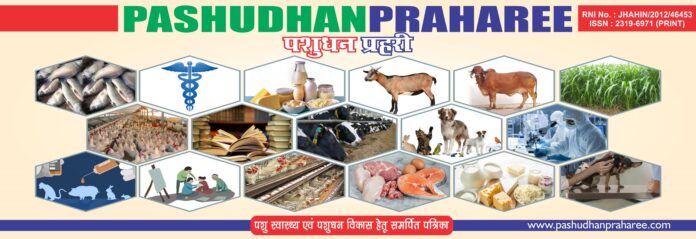Battling External Parasite Infestation in Farm Animals: Prevalence and Effective Management
Dr. Patil Harshal Rajendra
M. V. Sc surgery and Radiology
Introduction
External parasites pose a significant threat to the health and productivity of farm animals worldwide. The main ectoparasites includes ticks, mites, lice, and flies, not only cause discomfort and distress to the animals but also lead to economic losses for farmers due to reduced productivity and the cost of treatment. Understanding the prevalence of external parasite infestation and implementing effective management strategies are crucial for maintaining the welfare and profitability of farm operations.
Types of external Parasites
- Ticks: Ticks are small creatures with oval-shaped bodies. Ticks don’t have antennae and suck blood from animals, which can lead to anemia. They can also spread diseases like Thelieriosis and Babesiosis.
- Mites: Mites are tiny creatures, less than 1mm in length. They have unsegmented bodies and are usually seen under a microscope. Mite infestations, known as mange, cause severe irritation to the skin and can be a nuisance for animals.
- Lice: Lice are flat-bodied parasites. They come in two groups: sucking lice, which feed on the host’s body fluids, and chewing lice, which feed on skin, hair fragments, and debris. Lice are specific to particular hosts and can cause discomfort and irritation.
- Fleas: Fleas are flightless. They have flattened bodies, strong claws, and are usually brown in color. Fleas feed on the blood of their hosts and can jump up to 20-30cm with their hind legs.
- Flies: Flies have wings, mobile heads, and compound eyes. They have piercing and sucking mouthparts and come in various types, including stable flies, horse flies, and face flies. Flies can act as mechanical vectors for diseases, transmitting bacteria, viruses, and parasites to farm animals. They are most commonly seen in the summer and can be both biting flies and nuisance flies, causing irritation and discomfort to animals.
These different types of external parasites pose a threat to the health and well-being of farm animals and require proper management to prevent infestations and minimize their impact.
Effects of External Parasites on Farm Animals
- Blood Loss and Anemia: External parasites like ticks and lice bite and suck the blood of farm animals, causing severe anemia. This makes the animals weak and can even be life-threatening.
- Disruption of Feeding: Flies buzzing around animals while they graze can be irritating. This disturbance makes it hard for animals to eat properly, leading to weakness and debility. Examples include horn flies and forest flies.
- Winter Infestations: In winter, lice populations increase on animals’ bodies. They suck blood, causing anemia, and also irritate the skin, leading to hair loss.
- Skin Problems from Mites: Mites cause mange in animals, mainly affecting areas like the head, legs, body, and tail. This condition causes itching, crusted skin, and hair loss, making animals uncomfortable and affecting their feeding.
- Tick-Borne Diseases: Ticks can transmit diseases like paralysis tick paralysis, pyemia, and tick toxicosis, which harm animals’ health.
- Nuisance from Flies and Mosquitoes: Flies and mosquitoes bite animals and suck their blood, causing irritation during feeding and leading to health problems and reduced production.
- Skin Allergies and Immune Reactions: Parasite bites can trigger skin allergies and even severe immune reactions in animals.
- Wound Infestation: Flies lay eggs on open wounds or skin surfaces, causing myiasis. This results in blood loss, inflammation, and a decrease in production.
- Transmission of Diseases: External parasites act as vectors for various diseases.These diseases can cause severe production losses and economic harm to farmers.
External parasites acts as vectors for various diseases.
| Sr. no | External Parasite | Transmission of Disease |
| 1 | Ticks | Thileriosis, Babesiosis, Anaplasmosis, Staphylococcal infections, Lumpy skin disease |
| 2 | Fleas | Diphylidium caninum, Rickettsia typhi, Yersiniosis |
| 3 | Sheep ked
Culicoides |
Blue tongue |
| 4 | flies | Transmits E Coli, Salmonellosis, Trypanosoma spp., Leishmaniasis, Yellow fever, Fileriosis. Pink eye disease, Thelaziasis. |
| 5 | Lice | Swine pox virus, Trichophytan spp., Anaplasma marginale |
Overall, external parasites have significant negative effects on farm animals’ health, welfare, and productivity. Proper management and control strategies are essential to minimize these impacts and ensure the well-being of livestock.
Effective management of external parasites in farm animals involves multiple strategies:
- Housing and Environment: Maintain clean, well-ventilated housing with proper drainage to reduce moisture and limit breeding grounds for parasites. Regular cleaning and disinfection help control parasite populations.
- Biosecurity Measures: Implement strict protocols to prevent parasite introduction and spread. Quarantine newly acquired animals, restrict visitor access, and control wildlife populations around the farm.
- Pasture Management: Rotate grazing areas to break the parasite life cycle. Techniques like mowing and targeted grazing with other animals can naturally control parasite populations.
- Chemical Control: Use acaricides, insecticides, and dips to manage infestations when necessary. Follow label instructions and rotate active ingredients to prevent resistance and minimize environmental impact.
- Biological Control: Utilize natural enemies of parasites, such as predatory mites and parasitic wasps, to suppress populations. Introduce beneficial organisms to reduce reliance on synthetic pesticides.
- Genetic Selection: Breed animals for resistance to parasites. Selective breeding programs aim to develop breeds with inherent resistance, reducing the need for chemical interventions and improving overall animal health.
In conclusion, effective management of external parasites is crucial for maintaining farm animal health and productivity. By combining preventative measures, monitoring, and targeted treatments, farmers can control parasite populations while promoting sustainable and environmentally friendly farming practices. Embracing integrated pest management approaches and advancements in genetics and biological control methods are key to mitigating the impact of external parasites on farm animals in the long term.



